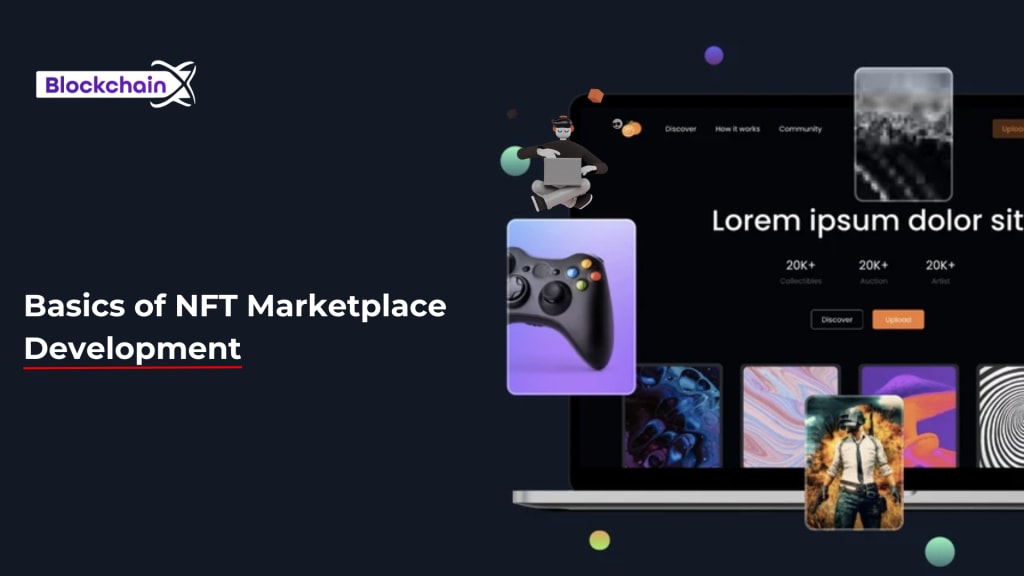
Over the coming years, you'll hear the word "NFT" a lot more. It stands for "token that is not fungible." In a technical sense, it enables us to tie ownership of certain digital assets with a unique identity. Furthermore, the term has been so popular lately that Collins' Dictionary named it Word of the Year for 2021. What is an NFT marketplace, then, and is it worthwhile to establish one? We go over the fundamentals of NFT marketplace building in this essay.
An NFT is a digital object that can be identified by a one-off code and is usually rare or unique.
Although NFTs have been operating since 2014, their use as a platform for the purchase and sale of digital assets has grown in the past few years due to the emergence of cryptocurrencies and digitization. Not surprisingly, NFT marketplaces are becoming increasingly popular.
They are essentially digital collectibles. As per Forbes, NFT assets that have been traded since 2017 have been valued at over £123 million, with a projected total of $340.0 million USD by 2020. Furthermore, a CAGR of 39.6% is expected to be achieved in this market by 2030.
Based on blockchain technology, non-fungible coins stand in for digital assets like articles, playlists, soundtracks, and artwork as well as in-game items and assets like virtual homes.
Why then have they gained such a following? While it is true that anybody can view these digital works online, an NFT uses blockchain networks to establish and track ownership in a way that is absolutely unchangeable and unfailing. For example, why would that matter to an art collector when the piece is freely available for download? According to Forbes, possessing the "digital bragging rights" to an artwork is nearly as significant as actually owning the piece.
But an NFT marketplace of its own is required in order to exchange NFTs. Thus, the future appears promising for creative companies hoping to establish an NFT marketplace. NFT markets are online stores where NFT tokens can be created, stored, sold (usually at a set price), and bought (in certain situations). They are the virtual equivalent of the Amazons. To guarantee the success of your platform build, it can be advantageous to seek the assistance of a blockchain software development business, as NFT marketplace development calls for specialised technical knowledge and abilities.
Why are NFT marketplaces needed?
NFTs and traditional or digital currencies vary primarily in that each token has a unique value instead of a fixed rate that is determined by the attributes of each token. This indicates that a like-for-like trade is not possible.
The only option to exchange NFTs is through an online NFT marketplace Development as these non-fungible tokens cannot be purchased or sold through either centralised or decentralised cryptocurrency exchanges. And for NFT marketplace development companies, this implies that NFT marketplace development will become more and more profitable.
Benefits of NFT marketplaces
The same advantages apply to NFT marketplaces since they are based on blockchain technology, and these benefits include:
Transparency: Because blockchain technology is real-time and unchangeable, all transactions made on an NFT marketplace are fully visible and impervious to manipulation.
Decentralisation allows for the replication and distribution of all data among the network's nodes. Additionally, the network is updated whenever a new block is added, and all peers can view the data.
Security: To prevent online fraud, breaches, and other cyber threats, blockchain technology gives NFT marketplaces built-in security features, cryptography, and consensus algorithms.
The Basics of NFT Marketplace Development
The first thing to be aware of is that general NFT marketplaces, like an NFT platform that specialises in the digital arts, are generally less desirable than niche ones.
Vendors of NFT marketplace development services can assist businesses in developing marketplace apps that let NFT users effectively complete their tasks with a single, simple interface. It's important to include the following in your list of requirements when thinking about the features of your NFT platform:
- Storefront
- Dashboard
- NFT Minting
- Listings and collections creation
- Listing status and token details
- NFT Filters
- Advanced search capabilities
- Bid-and-Buy functionality
- Wallet integration
- Ratings and reviews
After determining your niche, you can use the experience of the NFT marketplace development company of your choice to help you realise your idea. Your NFT platform's end-to-end development, which typically entails the following actions, can be assisted by this partner:
Selecting a blockchain: The most widely used ones are Ethereum, Binance Smart Chain, Solana, Cardano, and Polygon.
Specifying the work UX Design: Building a successful NFT marketplace platform requires streamlining and optimising your UX. A NFT marketplace development company can assist you in designing an interface that is easy to use, simple to understand, and enjoyable.
Front-end development: A seasoned provider of NFT marketplace development services can assist you in creating the framework for your NFT platform, ensuring that your users will readily adopt it and that it will function flawlessly.
Putting smart contracts into practice: Smart contracts handle every day operations in an NFT marketplace. They start every process that happens on an NFT platform. To get things started, an NFT marketplace development company can assist you in creating and implementing these smart contracts.
Configuring storage - Since storing data in the blockchain is expensive, all NFTs metadata linked to a specific token are usually stored off of the blockchain. Storing metadata in InterPlanetary File Systems (IPFS), a peer-to-peer network for gathering and exchanging data in a distributed file system, is one way to solve the problem.
The process of creating front- and back-end interfaces to communicate with the business logic of smart contracts that are implemented on the blockchain network is known as integration.
Testing is an essential stage in the development of the NFT marketplace because it enables developers to find and fix any bugs prior to deployment.
Deployment: Your NFT marketplace platform is prepared for production deployment following multiple iterations of comprehensive testing.
The above outlines the fundamental steps involved in creating an NFT marketplace from the ground up with the assistance of a knowledgeable blockchain software development team. However, you can also build a White Label NFT marketplace, which is essentially an NFT marketplace clone that you can later modify to suit your requirements.
What are the business use cases for NFTs?
NFTs are certainly the subject of a lot of hype at the moment, but this is more than just a fleeting trend. Therefore, the development of the NFT marketplace will be much more important in the virtual world than it is now. Aside from the arts and in-game commodity trading, NFTs present some intriguing business applications, which is what makes them appealing to companies considering venturing into the development of NFT marketplaces. These are only a small portion of them.
Gaming
The gaming market is very large. The market was estimated to be worth $180 billion in 2021, and by 2025, it is expected to soar to a whopping $256.97 billion. The trading of digital commodities has also grown quickly in the gaming industry. Examples of these types of games are the immensely popular fighting game and NFT platform Axie Infinity, where players can trade and collect tiny digital creatures known as Axies. With a 24-hour trading volume of $600,737,442 USD, the current Axie Infinity trading price is $63.89 USD. Competent players may be able to accumulate, breed, and exchange their characters, leaving them with cryptocurrency in their virtual "bank."
The interesting thing is that the uptake hasn't peaked yet because games have a longer development lifespan than, say, digital artwork. This implies that NFT platform developers may find that joining the bandwagon now is a very profitable opportunity.
DeFi NFTs
"DeFi" refers to the blockchain-based decentralised finance system. NFTs can be used as collateral to settle debts in the age of cryptocurrencies.
Let's say you invested a significant amount of cryptocurrency to buy digital art or an in-game item. This works similarly to a digital pawnshop in that it can be placed down to pay off debt and then refunded to you after the debt is settled. Furthermore, smart contracts ensure that the lender receives the NFT automatically in the event that you are unable to pay your debt, so there is no risk to them if you default on your loan.
Fashion
A digital jacket from virtual fashion brand RTFKT sold for more than $125,000 at the beginning of 2021. Then, in October of last year, Dolce & Gabbana sold a set of NFT clothes for $6 million. Red DAO, a decentralised cryptocurrency community that makes investments in digital fashion, was one of the buyers, among others.
Additionally, a growing number of upstart, creative NFT-first fashion labels are creating digital clothing—sometimes in addition to physical items—for the market of well-informed cryptocurrency users. This virtual couture has even been shown at London Fashion Week and can be worn with augmented and virtual reality technologies. Furthermore, it makes sense that haute couture would enter the NFT market—the world of digital collectibles—given its status as the ultimate collectors' item.
Event ticketing
An additional intriguing application of NFT is in the ticketing space, where users can engage with venues to buy tickets peer-to-peer without the need for an intermediary. Here, blockchain serves as a third-party platform to enable transactions and NFT, which confirms that a ticket is authorised for a particular individual. The ownership proof is saved on the blockchain and protected by the special qualities of NFT, which prevent it from being altered, removed, or replaced with another token.
By using NFTs to mimic the features of privilege cards, the media and entertainment sectors can also reward their audience with loyalty points and other benefits. Because an NFT keeps track of every transaction, the venue can see which events a user has attended and can make customised offers to increase engagement and increase sales.
NFT community platforms
However, a lot of people would counter that if you don't have anywhere to put your NFT couture, multimillion dollar digital artworks, or musical compositions on display, what good are they? NFT platforms, or communities, play a role in this. It's highly likely that in the near future, NFT platforms with the attractive feature of allowing NFT buyers to virtually meet and greet with other collectors who share their interests and to showcase their digital assets will start to appear.
While there are already some, it is anticipated that this trend will continue and result in the creation of an increasing number of immersive NFT platform environments designed for online work, teamwork, and social interaction.
About the Creator
Boopathi
Digital Marketer , SEO Analyst






Comments
There are no comments for this story
Be the first to respond and start the conversation.